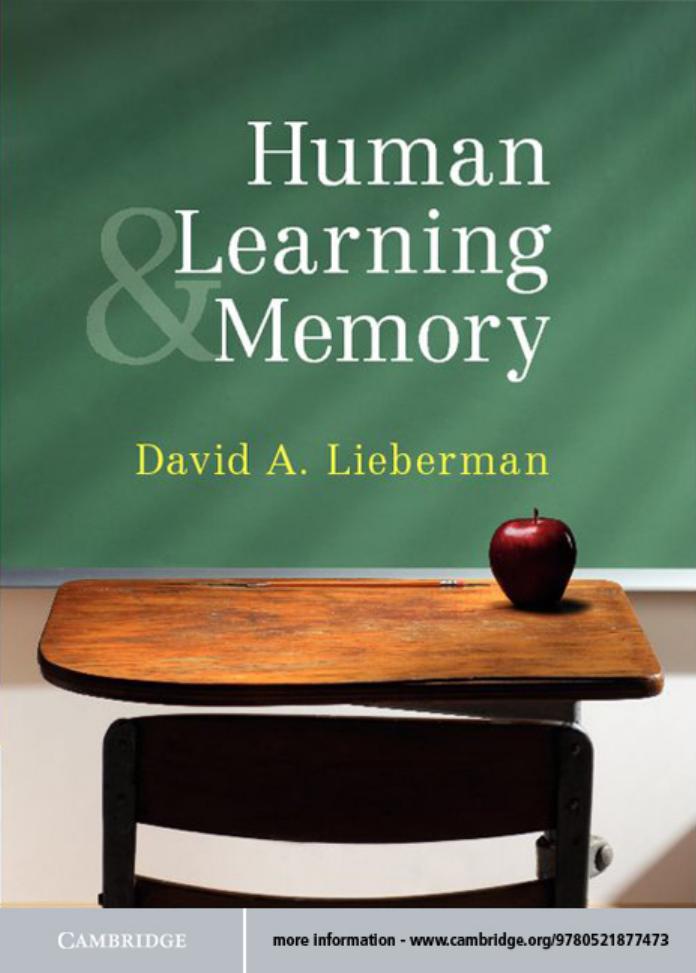Human Learning and Memory by David A. Lieberman

Author:David A. Lieberman
Language: eng
Format: epub, pdf
Publisher: Cambridge University Press
Published: 2012-07-14T16:00:00+00:00
As Ebbinghaus had predicted, then, it appeared that under some circumstances memory can be virtually permanent (see also Conway, Cohen, and Stanhope, 1991). Moreover, Bahrick provided evidence that this impressive retention was due to the principles that Ebbinghaus had identified some 100 years earlier – above all, frequency and distribution of practice. Bahrick compared participants who had taken one, three, or five Spanish courses on their memory for elementary vocabulary – material that would have been learned in the first course – and found substantially better performance in participants who had taken more courses. He estimated that the level of permanent recall in participants who had taken only one course was virtually zero, rising to about 30% after three courses, and over 60% after five courses. The more students practiced their vocabulary – even at a stage where they might have thought they already knew it well – the better they later remembered it.
Bahrick also investigated the effects of spacing practice. In one study, Bahrick and Phelps (1987) compared the performance of students who learned 50 Spanish words in lessons spread 1 day apart with that of students who received the same number of lessons but separated by 30 days. When tested 8 years later, the students who had distributed their practice recalled almost twice as much, even though the total amount of time the two groups had spent studying was identical. (See also Bahrick et al., 1993.)
Long-term memory seems to depend crucially on extensive practice – in studying a foreign language, students repeat the same vocabulary over and over again – and, perhaps equally important, on people having the opportunity to review or refresh their memories at periodic intervals.
To summarize our discussion of Ebbinghaus, he has unquestionably proved to be one of the giants in the history of psychology. After centuries in which our only knowledge of how the mind works was based on armchair speculation, he showed that the principles of memory could be investigated empirically. With only one participant and no support, he invented procedures that guided research on memory for almost a century, and he used these techniques to discover principles that are still valid (for example, Rubin and Wenzel, 1996; Meeter, Murre, and Janssen, 2005). Inevitably, later research suggested new principles, but it was Ebbinghaus who provided the foundation for this research. (For further discussion of his contributions, see Kintsch, 1985; Slamecka, 1985; Gorfein and Hoffman, 1987.)
Download
Human Learning and Memory by David A. Lieberman.pdf
This site does not store any files on its server. We only index and link to content provided by other sites. Please contact the content providers to delete copyright contents if any and email us, we'll remove relevant links or contents immediately.
The Art of Thinking Clearly by Rolf Dobelli(9810)
Mindhunter: Inside the FBI's Elite Serial Crime Unit by John E. Douglas & Mark Olshaker(8647)
Change Your Questions, Change Your Life by Marilee Adams(7320)
Nudge - Improving Decisions about Health, Wealth, and Happiness by Thaler Sunstein(7190)
Mastermind: How to Think Like Sherlock Holmes by Maria Konnikova(6894)
The Power of Now: A Guide to Spiritual Enlightenment by Eckhart Tolle(5291)
Men In Love by Nancy Friday(4930)
Altered Sensations by David Pantalony(4830)
Factfulness: Ten Reasons We're Wrong About the World – and Why Things Are Better Than You Think by Hans Rosling(4454)
The Confidence Code by Katty Kay(3993)
Thinking in Bets by Annie Duke(3970)
Man and His Symbols by Carl Gustav Jung(3803)
The Worm at the Core by Sheldon Solomon(3293)
Why Buddhism is True by Robert Wright(3258)
Three Women by Lisa Taddeo(3255)
Liar's Poker by Michael Lewis(3192)
Descartes' Error by Antonio Damasio(3139)
The Inner Life of Animals by Peter Wohlleben(3074)
The Power of Mindful Learning by Ellen J. Langer(3056)
